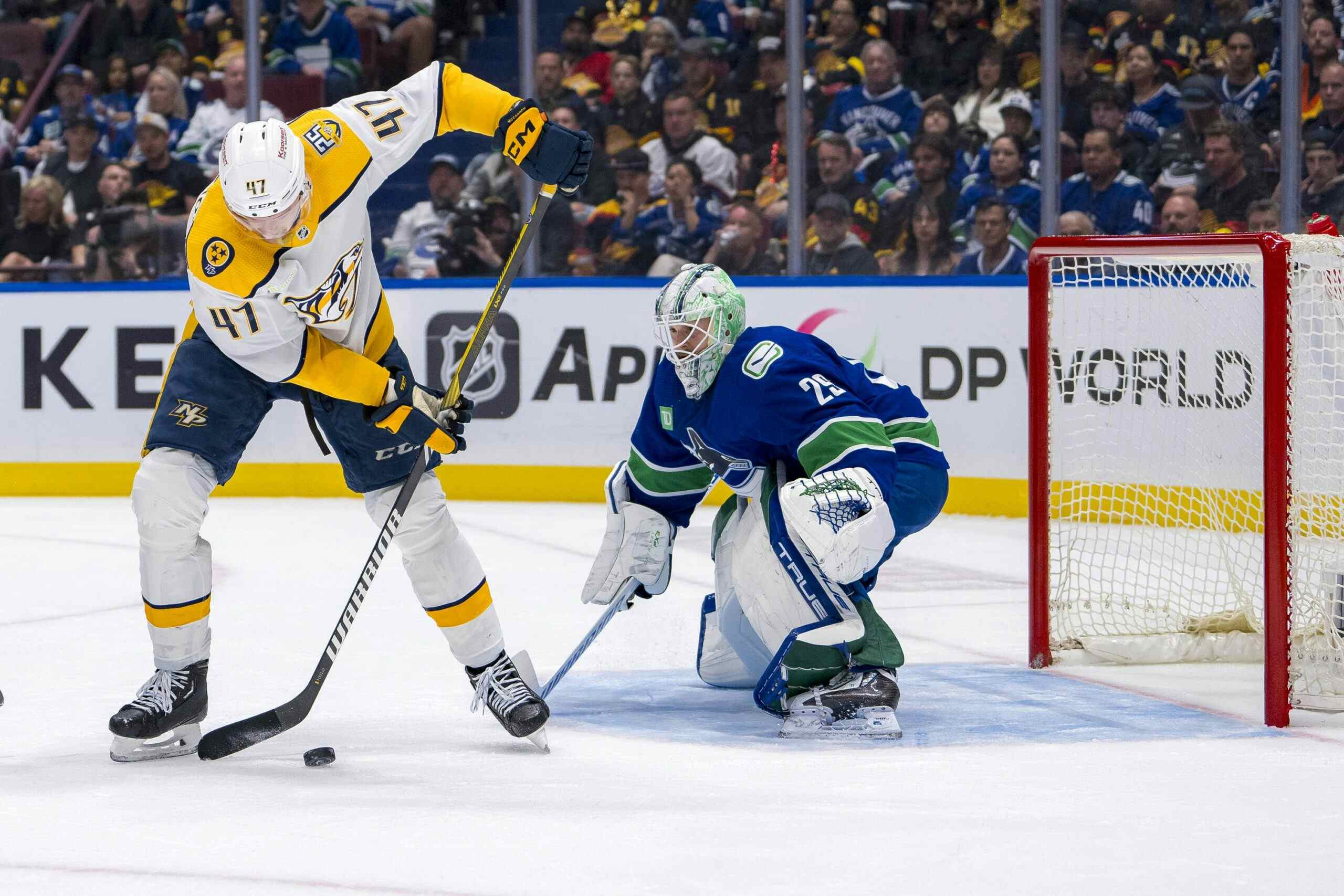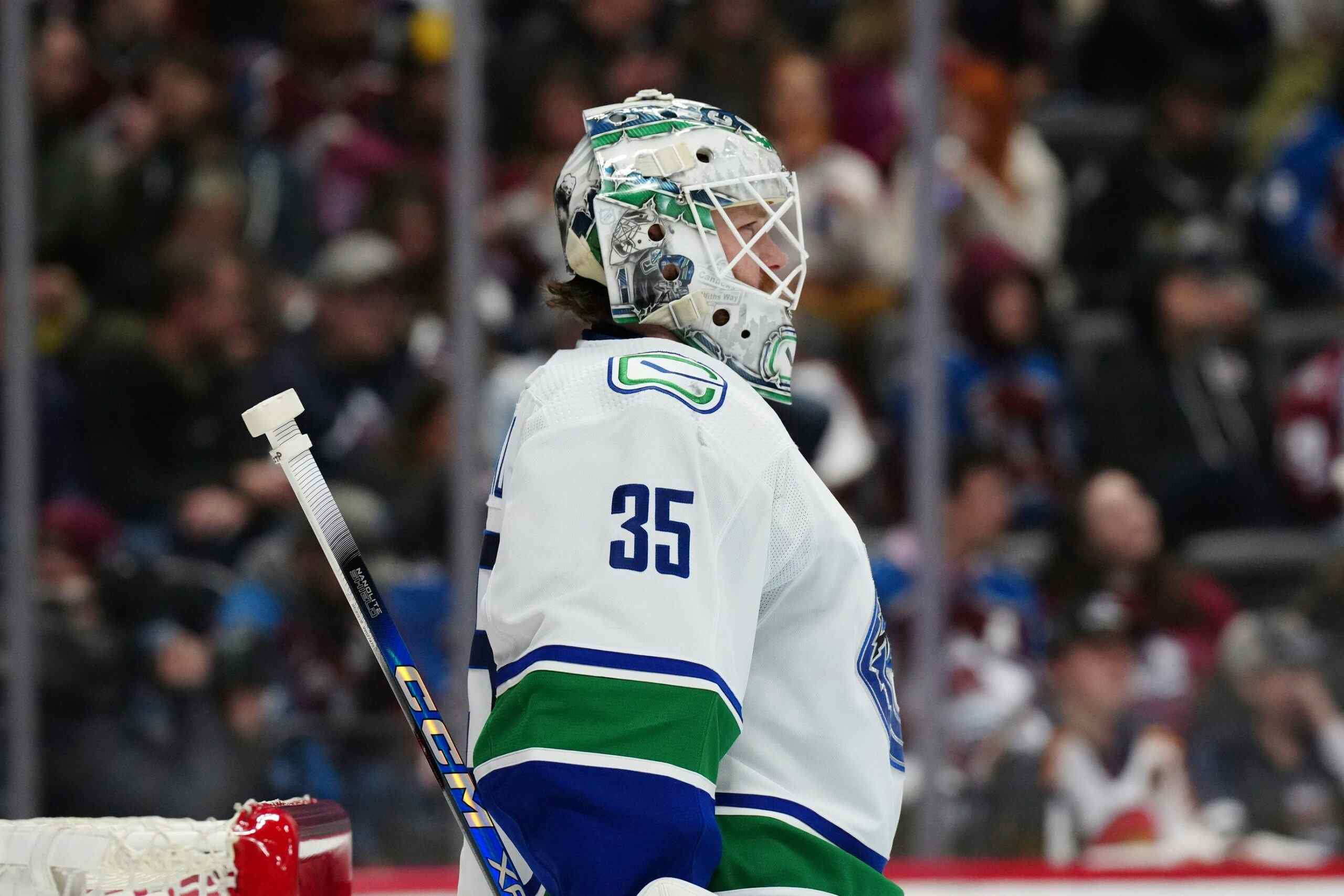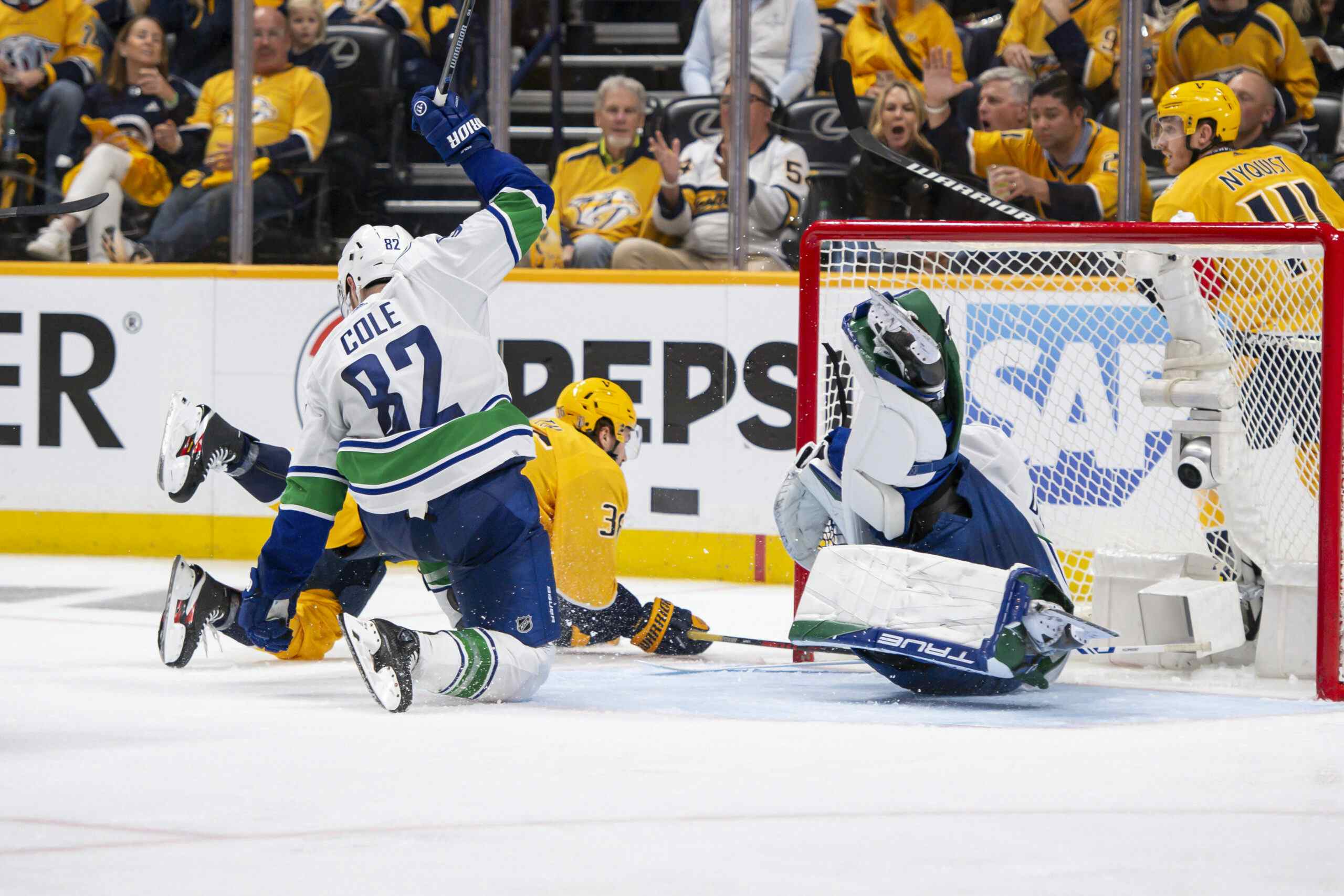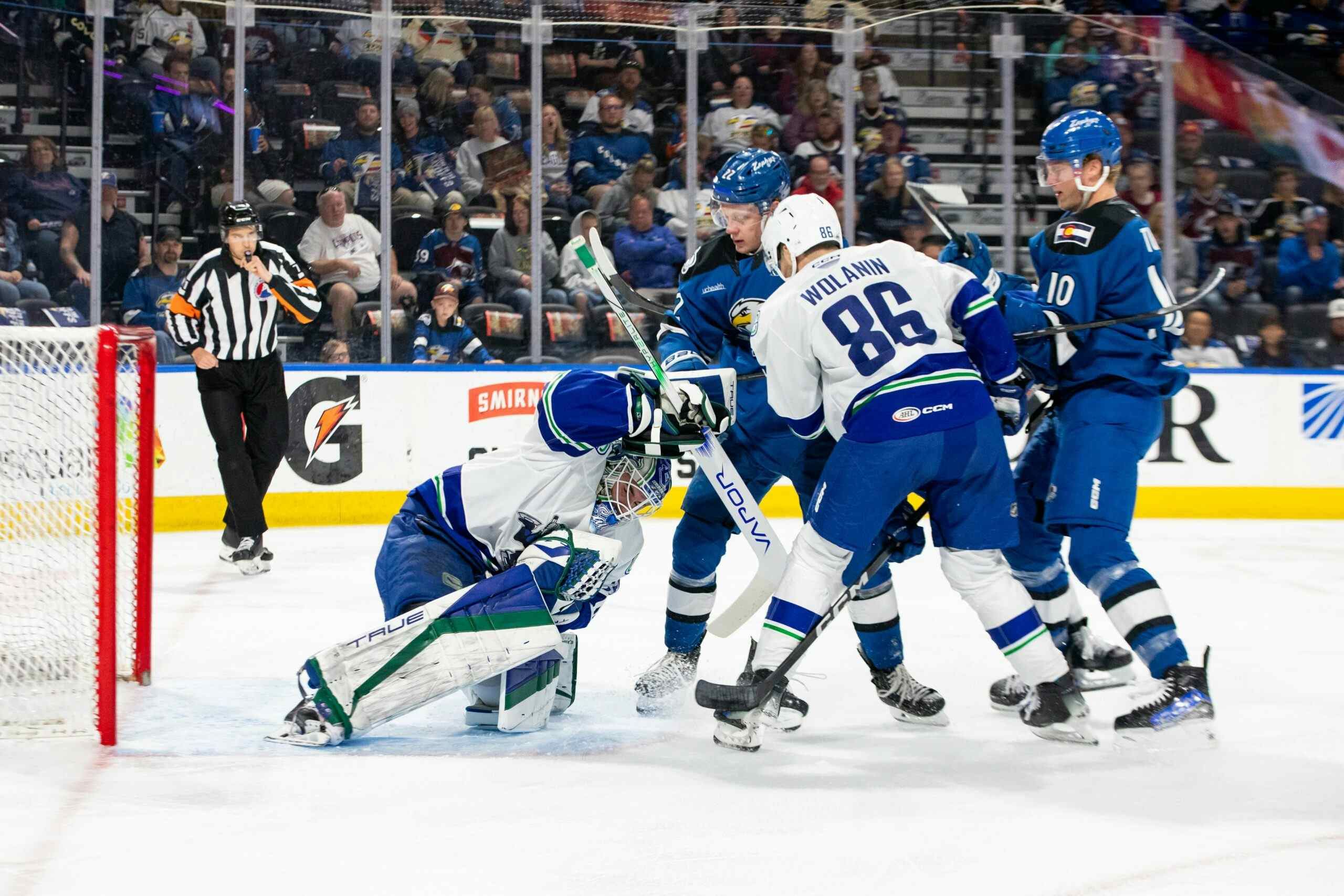Ebbett Does Dallas
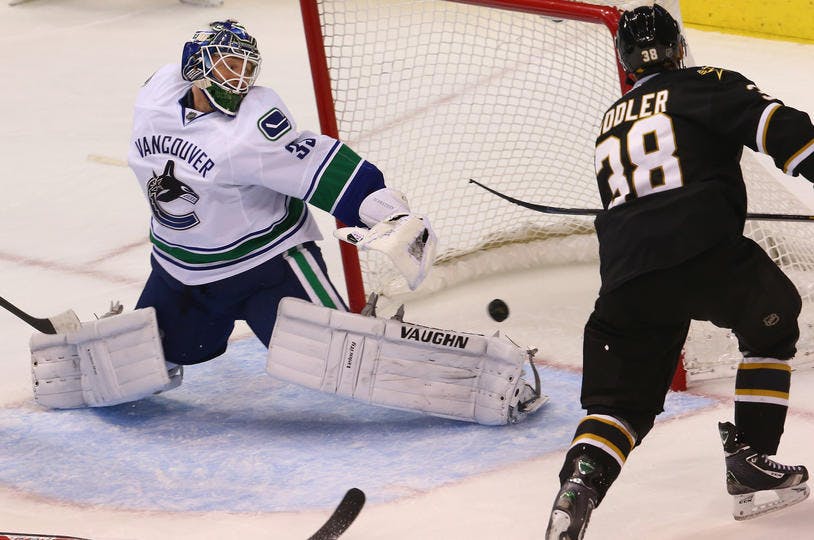
What does Cory Schneider have in common with laundry? Both get hung out to dry.
Photo by Ronald Martinez/Getty Images
The Canucks finished up their season long five game roadtrip in Dallas on Thursday night not with a whimper, but with a bang. Unfortunately it was a bang of the wrong sort, like a flashbang, as the Canucks got lit up for four goals in the third period – three of them in quick succession – by a pretty mediocre team in the Dallas Stars.
But you know what’s white and blue and not nearly as bad as it looked on Thursday night? The Canucks. Actually, the team was probably the better club on the whole in this game, though it wasn’t enough to prevent the game from getting away from them in dramatic fashion in the latter half of the contest…
Read past the jump for scoring chance data and analysis.
– Let’s start with the scoring chance numbers, which admittedly don’t tell the story of this game as well as they do on some nights. The Canucks were out-chanced by the Dallas stars by an aggregate tally of 18 to 16, a relatively narrow margin considering the lopsided 5-1 score. Weirder still is that the Canucks out-chanced the Stars at even-strength, recording fifteen scoring chances at five-on-five to just thirteen for the Stars. The Canucks also out-chanced the Stars 12 to 9 with the score tied. In other words, if the Canucks were to play the way they did on Thursday ten times, they’d probably win six of those games.
– So what went wrong? The answer here is obvious: lots of things.
– I’m not really going to leave it at that. Vancouver was afflicted on Thursday with careless turnovers (Keith Ballard channeling Bill Buckner on Dallas’ third goal especially), boneheaded defensive coverage (Barker on the Eakins game winner) and a third-line that was completely crushed by the Stars. Also, Kari Lehtonen outplayed Cory Schneider but that’s a secondary reason for why Thursday’s game went sideways so quickly for Vancouver’s club…
– But let’s dwell on Cory Schneider’s performance before we move on. In five games on the team’s now concluded roadtrip, Cory Schneider was blown up twice in three starts (against Colorado and Dallas). Then again, he was masterful in his other start against the St. Louis Blues on Tuesday. Schneider has been on a ridiculous run over the past month and a bit, so it was inevitable that he’d run into a couple of tough outings eventually. You can’t deny regression forever, and for the most part it’s come in the form of insane giveaways from his defenseman. Tough to blame Cory Schneider for, say, Landeskog’s goal in Colorado, or pretty much any of the goals he surrendered tonight with the exception of the Eakins game winner.
– Still, Schneider wasn’t particularly good in this one, and I’d wager he’s unhappy with his own performance. On the one hand he stopped all 17 outside shots he faced, on the other, he stopped only 8 of 13 difficult shots (for a .615 save percentage on difficult shots). The fact is, that’s not good enough to get it done on most nights.
– The Derek Roy, Ryan Kesler line had their best game as a group tonight. In fact, they were borderline dominant. The Sedin twins also generated scoring chances aplenty as even-strength. Unfortunately for the Canucks, the third line gave it all back. Here’s the scoring chance differential by line tonight: the Sedin line was plus five, the Kesler/Roy line was also +5 and the Andrew Ebbett line was -6. Basically a good effort from the twins and Kesler was completely sabotaged by a third group that couldn’t hang with, and I’m not kidding, a primary matchup against Cody Eakin, Ryan Garbutt and and Reilly Smith. This asinine experiment of playing Derek Roy with Ryan Kesler has to end…
– It was a similar story with Vancouver’s defence pairings on Thursday. The Canucks legitimately controlled the game with Jason Garrison and Dan Hamhuis on the ice. With Cam Barker and Alex Edler on the ice, however, that was when Dallas did pretty much all of their meaningful damage. Andrew Alberts had ,a tough game on the penalty-kill but didn’t fare too badly at even-strength and Ballard was mostly fine except for that one atrocious giveaway that led directly to a Dallas goal. Ballard is lucky Vancouver’s blueline depth has been ravaged so thoroughly of late, if Tanev and Bieksa were healthy he might not see the ice for another month!
– The negative suckholism of Canucks fans, and some in the Vancouver media who seem to fall all over each other to be the most negative commentator, gets old in a hurry. Maybe it’s because I deal with it a lot on Twitter, but following a game like this – one in which Vancouver’ completely controls the contest at even-strength and still loses because sometimes the hockey gods are dicks – I find it particularly aggravating. Basically what happened was this: Dallas had the better special teams performance and got ridiculous goaltending for thirty minutes, then took advantage of a couple of unforced errors to build a massive lead. That’s going to happen occassionally over the course of a season, even one shortened by a lockout, and it isn’t a reason (or at least a good reason) to panic about this team’s playoff hopes.
Take a step back from your first impression, look at the data, and it becomes clear that Vancouver’s top-two lines and top-pairing were very good on Thursday night. That bodes well for the team going forward, just so long as they quickly abandon such foolish notions as "Cam Barker can play top-four minutes" or "Andrew Ebbett is a third line centre." Man…
Scoring Chance Data:
A chance is counted any time a team directs a shot cleanly on-net from within home-plate. Shots on goal and misses are counted, but blocked shots are not (unless the player who blocks the shot is “acting like a goaltender”). Generally speaking, we are more generous with the boundaries of home-plate if there is dangerous puck movement immediately preceding the scoring chance, or if the scoring chance is screened. If you want to get a visual handle on home-plate, check this image.
Scoring Chance Totals:
| Scoring Chance Totals | 1st | 2nd | 3rd | Total |
|---|---|---|---|---|
| Vancouver (EV) | 8 (8) | 5 (5) | 3 (2) | 16 (15) |
| Dallas (EV) | 4 (4) | 7 (5) | 7 (4) | 18 (13) |
Individual Scoring Chance Contributions:
| Individual Chance Contributions | Taken | Created | Total |
|---|---|---|---|
| Derek Roy | 3 | 1 | 4 |
| Jannik Hansen | 2 | 1 | 3 |
| Alex Edler | 2 | 1 | 3 |
| Zack Kassian | 2 | 0 | 2 |
| Mason Raymond | 1 | 1 | 2 |
| Henrik Sedin | 1 | 1 | 2 |
| Daniel Sedin | 1 | 1 | 2 |
| Andrew Ebbett | 1 | 1 | 2 |
| Keith Ballard | 1 | 0 | 1 |
| Cam Barker | 1 | 0 | 1 |
| Alex Burrows | 1 | 0 | 1 |
| Ryan Kesler | 0 | 1 | 1 |
| Andrew Alberts | 0 | 1 | 0 |
Individual Chance Differential:
| EV F – A | PP F – A | SH F – A | Total F – A | |
|---|---|---|---|---|
| Dan Hamhuis | 6 – 4 | 0 – 0 | 0 – 2 | 6 – 6 |
| Keith Ballard | 5 – 4 | 0 – 0 | 0 – 1 | 5 – 4 |
| Jason Garrison | 7 – 3 | 0 – 0 | 0 – 1 | 7 – 4 |
| Zack Kassian | 5 – 8 | 0 – 0 | 0 – 0 | 5 – 8 |
| Steve Pinizzotto | 0 – 1 | 0 – 0 | 0 – 0 | 0 – 1 |
| Alex Burrows | 6 – 2 | 0 – 0 | 0 – 0 | 6 – 2 |
| Derek Roy | 6 – 1 | 0 – 0 | 0 – 2 | 6 – 3 |
| Ryan Kesler | 4 – 1 | 0 – 0 | 1 – 0 | 5 – 1 |
| Cam Barker | 4 – 5 | 0 – 0 | 0 – 0 | 4 – 5 |
| Mason Raymond | 3 – 9 | 0 – 0 | 0 – 2 | 3 – 11 |
| Daniel Sedin | 7 – 2 | 0 – 0 | 0 – 0 | 7 – 2 |
| Alex Edler | 4 – 7 | 0 – 0 | 1 – 1 | 5 – 8 |
| Andrew Ebbett | 3 – 8 | 0 – 0 | 0 – 0 | 0 – 0 |
| Dale Weise | 0 – 2 | 0 – 0 | 0 – 2 | 0 – 4 |
| Henrik Sedin | 7 – 2 | 0 – 0 | 0 – 0 | 7 – 2 |
| Jannik Hansen | 4 – 1 | 1 – 2 | 0 – 0 | 5 – 3 |
| Maxim Lapierre | 0 – 2 | 0 – 0 | 0 – 2 | 0 – 4 |
| Andrew Alberts | 4 – 3 | 0 – 0 | 1 – 3 | 4 – 6 |
Recent articles from Thomas Drance

